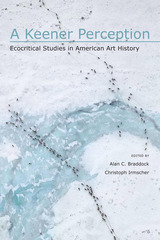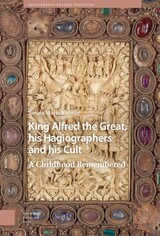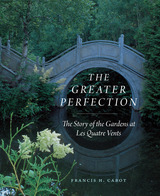742 books about Historiography and 3
start with K
742 books about Historiography and 3
742 books about Historiography
3 start with K start with K
3 start with K start with K

A Keener Perception
Ecocritical Studies in American Art History
Edited by Alan C. Braddock and Christoph Irmsher
University of Alabama Press, 2009
A landmark collection of essays on the intersections of visual art, cultural studies, and environmental history in America.
Issues of ecology--both as they appear in the works of nature writers and in the works of literary writers for whom place and the land are central issues--have long been of interest to literary critics, and have given rise over the last two decades to the now firmly established field of ecocriticism. The essays in this volume, written by art historians and literary critics, seek to bring the study of American art into the expanding discourse of ecocriticism.
A Keener Perception offers a series of case studies on topics ranging from John White's watercolors of the Carolina landscape executed during Sir Walter Raleigh's 1585 Roanoke expedition to photographs by environmental activist Eliot Porter. Rather than merely resurrect past instances of ecologically attuned art, this volume features essays that resituate many canonical figures, such as Thomas Eakins, Aaron Douglas, and Thomas Cole, in an ecocritical light by which they have yet to be viewed. Studying such artists and artworks through an ecocritical lens not only provides a better understanding of these works and the American landscape, but also brings a new interpretive paradigm to the field of art history--a field that many of these critics believe would do well to embrace environmental concerns as a vital area of research.
In highlighting the work of scholars who bring ecological agendas to their study of American art, as well as providing models for literary scholars who might like to better incorporate the visual arts into their own scholarship and teaching, A Keener Perception is truly a landmark collection--timely, consequential, and controversial.
Issues of ecology--both as they appear in the works of nature writers and in the works of literary writers for whom place and the land are central issues--have long been of interest to literary critics, and have given rise over the last two decades to the now firmly established field of ecocriticism. The essays in this volume, written by art historians and literary critics, seek to bring the study of American art into the expanding discourse of ecocriticism.
A Keener Perception offers a series of case studies on topics ranging from John White's watercolors of the Carolina landscape executed during Sir Walter Raleigh's 1585 Roanoke expedition to photographs by environmental activist Eliot Porter. Rather than merely resurrect past instances of ecologically attuned art, this volume features essays that resituate many canonical figures, such as Thomas Eakins, Aaron Douglas, and Thomas Cole, in an ecocritical light by which they have yet to be viewed. Studying such artists and artworks through an ecocritical lens not only provides a better understanding of these works and the American landscape, but also brings a new interpretive paradigm to the field of art history--a field that many of these critics believe would do well to embrace environmental concerns as a vital area of research.
In highlighting the work of scholars who bring ecological agendas to their study of American art, as well as providing models for literary scholars who might like to better incorporate the visual arts into their own scholarship and teaching, A Keener Perception is truly a landmark collection--timely, consequential, and controversial.
[more]

Keeping the Faith
Ordinary People, Extraordinary Lives
Wayne Flynt
University of Alabama Press, 2011
This historical memoir by the widely recognized scholar, Wayne Flynt, chronicles the inner workings of his academic career at Samford and Auburn Universities, as well as his many contributions to the general history of Alabama. Flynt has traveled the state and the South lecturing and teaching both lay and academic groups, calling on his detailed knowledge of both the history and power structures in Alabama to reveal uncomfortable truths wherever he finds them, whether in academic institutions that fall short of their stated missions, in government and industry leaders who seek and hold power by playing to the fears and prejudices of the public, or in religious groups who abandon their original missions and instead seek financial and emotional comfort in lip service only.
In doing so he has not only energized those who think the State of Alabama can and must do better, but also has earned the enmity of those who prosper, profit, and prevaricate for their own selfish ends. Nevertheless, Flynt utilizes a lifetime of learning and reflection to voice the conscience of his community. Keeping the Faith: Ordinary People, Extraordinary Lives tells the story of his life and his courageous battles against an indifferent or hostile hierarchy with modesty and honesty. In doing so he tells us how Alabama institutions really are manipulated and, more importantly, why we should care.
[more]

King Alfred the Great, his Hagiographers and his Cult
A Childhood Remembered
Tomás Mario Kalmar
Amsterdam University Press, 2023
This book situates Alfred the Great in his hagiographic context. For 150 years, the fables told in the ninth century about Alfred’s childhood have posed interlocking disciplinary challenges to historians committed to evicting romance from history. Blending current Hagiography Studies with historical, literary, and biblical hermeneutics can help us forgo the anti-hagiographic commitments which motivated the scholars who purified the Victorian cult of Alfred by expunging his legends and salvaging his historicity. The book focusses on the typological functions of three Alfredian fables from the Old English Chronicle, the Old English Boethius, and Asser’s Vita Ælfredi, analyses the plot common to all three, critiques the psychological conjecture that Alfred’s childhood memory was their common source, and shows that synoptically they can help us see how Alfred shaped the curve of his own life’s destiny and how he engaged in the formation of his own cult to last a thousand years.
[more]
READERS
Browse our collection.
PUBLISHERS
See BiblioVault's publisher services.
STUDENT SERVICES
Files for college accessibility offices.
UChicago Accessibility Resources
home | accessibility | search | about | contact us
BiblioVault ® 2001 - 2024
The University of Chicago Press









